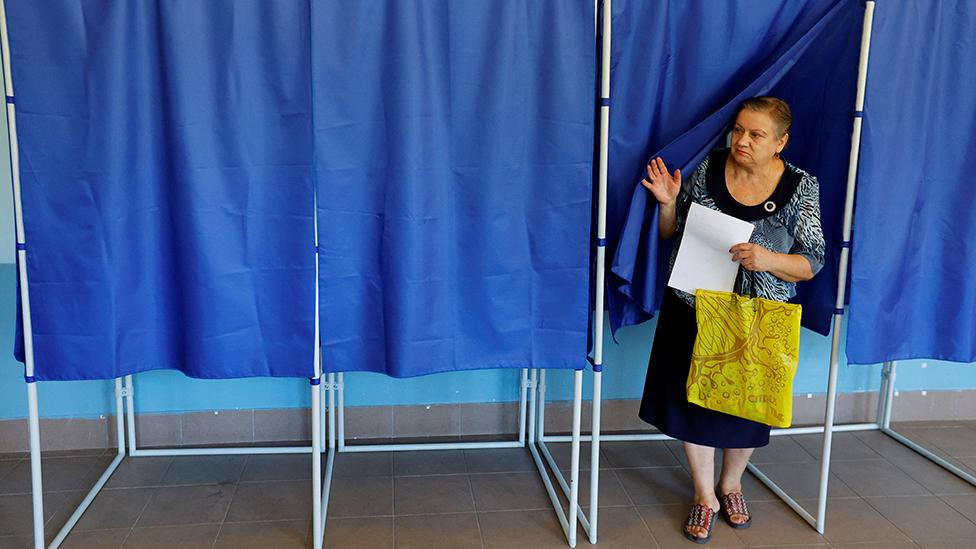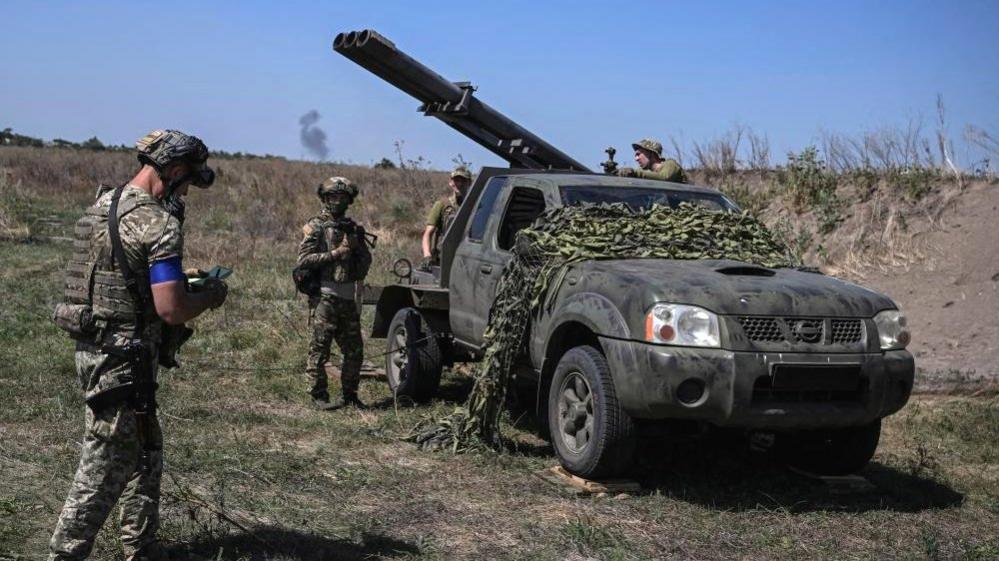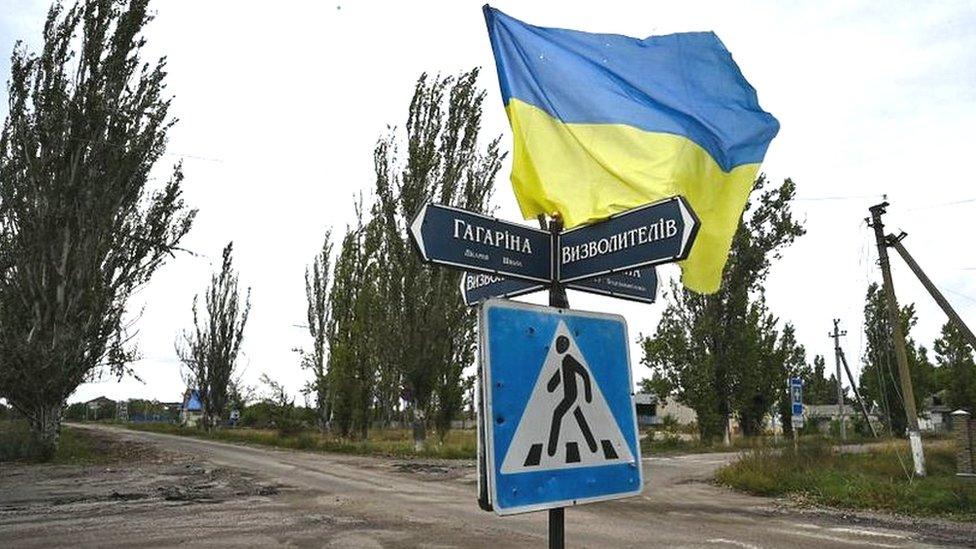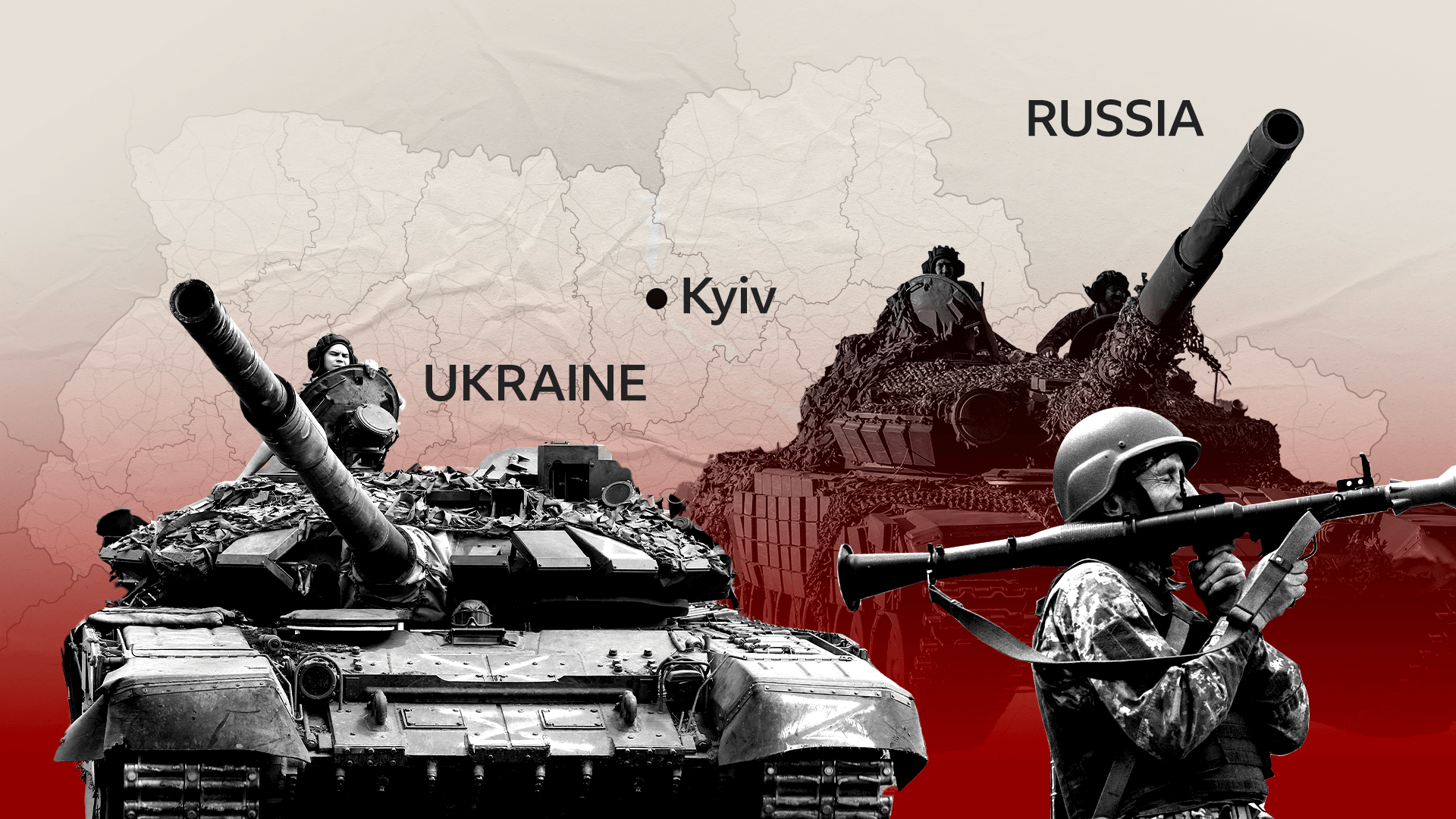Ukraine condemns 'sham' elections in Russian-occupied regions
- Published
- comments

The elections are taking place in regions of Ukraine that Russia claimed as its own last year
People living in Russian-occupied areas of Ukraine are being asked to vote in what the authorities are describing as local elections.
Ukraine's foreign minister called the polls a "sham", saying the votes would not have any legal standing.
Candidates are all either Russian or pro-Russian, and include governors hand-picked by Moscow.
Many taking part in early polling have been asked to cast their votes in the presence of armed Russian soldiers.
Ukrainian officials have said any Ukrainian citizens involved in organising the elections can expect to be punished in the future.
The Council of Europe, a human rights body, condemned the move in the "illegally annexed Ukrainian territories" as a "flagrant violation of international law, which Russia continues to disregard".
Not only are these areas an integral part of Ukraine, but the decision to hold elections there "creates the illusion of democracy", the council said in a statement.
US Secretary of State Antony Blinken also decried the polls saying: "Russia's sham elections in occupied areas of Ukraine are illegitimate." This sparked a response from the Russian embassy in the US, which accused Washington of meddling in Moscow's internal affairs.
The elections, which conclude on Sunday, and are taking place in four regions that Russia does not even fully control - Donetsk and Luhansk in the east, and the southern regions of Zaporizhzhia and Kherson.
Together they make up around 15% of Ukraine's sovereign territory.
Elections are also taking place in Crimea - under illegal Russian occupation since 2014 - and are being run in parallel to local polls in Russia itself.
Under the eyes of armed soldiers
Images shared by Russia's election commission provide an almost surreal glimpse into the polling stations.
As well as the expected setups in schools and administrative buildings, some stations are in the backyards of homes or even on street benches.
Photos depict voters dropping ballots into boxes seemingly under the watchful eyes of heavily-armed, balaclava-clad soldiers. Some photos showed polls being dropped into clear plastic ballot boxes, with the votes clearly visible.
The commission reports that the voter turnout for so-called regional parliaments has exceeded 50% in Kherson and 40% in Donetsk.
This is a much higher than seen in Russian regional polls in the last decade. It also stands out given that the Russian military does not have complete control over the claimed regions, and pulled out of the city of Kherson, the regional capital, almost a year ago.
There are no independent observers to validate these elections and the total vote count has not been disclosed.
The exiled mayor of the city of Melitopol Ivan Fedorov described the elections as "illegal and worthless", saying that many candidates in the Zaporizhzhia region were not residents, with some even coming from Siberia in Russia's far east.
He told the AP news agency, external the city had faced tighter security in recent days and residents were intimidated because voting in an occupied city was like "voting in a prison".
The four occupied regions where elections are taking place were claimed by Moscow as its own in September last year, after holding illegal annexation referendums on the future of the occupied lands.
Those referendums were also condemned by the international community as a sham - with reports of over 99% support for the regions switching to Moscow's control.
In the occupied lands, Russia has banned the use of Ukraine's currency since January.
Moscow has said it is rolling out its own mobile networks and will refurbish schools. But as recently as August, Russian authorities admitted that only about 20% of schools in these regions had seen reconstruction, and its regular mobile networks are conspicuously missing in the occupied zones.
In an unusual move, Ukrainians have been able to cast their ballots using their Ukrainian passports. This might be because a significant number have not adopted Russian nationality.
The Zaporizhzhia region - one of the areas where Russia is holding elections - is also the focus of Kyiv's counter-offensive, which was launched in the summer.
Ukrainian generals claim they have breached Russia's formidable first line of defences in that region, suggesting the counter-offensive there is poised to gain momentum.
Analysts at the US-based Institute for the Study of War (ISW) say recent advances there are "tactically significant" and are "widening the Ukrainian breach of Russian defensive lines in the area and threatening Russian secondary lines of defence".
The focus of Ukraine's efforts there have been around the village of Robotyne, which is some 56km (35 miles) south-east of the city of Zaporizhzhia, the regional capital. Kyiv would like to see its forces cut the Russian supply lines that allow Moscow's forces to maintain a presence in the southern part of the Kherson region.
However, on Friday Ukraine's President Volodymyr Zelensky said that Moscow's air superiority was impeding the counter-offensive, and complained that arms deliveries and sanctions on Russia from the West were becoming "complicated and slower".
Ukraine has been pushing hard for American-made F-16 fighter jets to counter Russia's advantage in the skies since last year. Some craft have been promised, but it is expected to be months before Kyiv would be able to use them.
Kyiv has relied on billions of dollars of Western military equipment to go on the offensive, and admitted that progress is slower than desired through the heavily fortified Russian defences.
President Zelensky compared his troops' advance with the pace of Western support, saying: "When some partners say: so what about the counter-offensive, when will the next step be? My answer: today, our steps are certainly faster than the new sanctions packages."

Related topics
- Published3 September 2023

- Published30 September 2022

